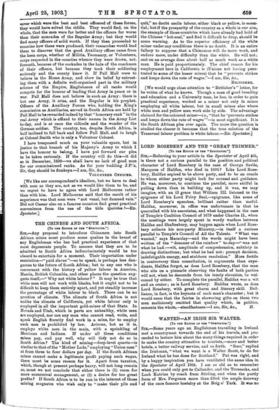THE CHINESE AND SOUTH AFRICA.
[To THE EDITOR 07 TER " SPECTATOR:1 Sin,—Any proposal to introduce Chinamen into South African mines must produce some qualms in the breast of any Englishman who has had practical experience of that most degenerate people. To assume that they are to be admitted to South Africa indiscriminately would be too absurd to entertain for a moment. Their importation under restriction—" paid slaves "—so to speak, is perhaps less dan- gerous to the future of South Africa; but to any one who is conversant with the history of yellow labour in America, Manila, British Columbia, and other places the question sug- gests itself,—" Why not white labour ? " It may be true that white men will not work with blacks, but it ought not to be difficult to keep them entirely apart, and yet steadily increase the percentage of white labour to black. There can be no question of climate. The climate of South Africa is not unlike the climate of California, yet white labour only is employed in all the important gold-mines of that State. In Nevada and Utah, which in parts are unhealthy, white men are employed, nor can any man who cannot read, write, and speak English fluently find work in a mine, for to employ such men is prohibited by law. Arizona, hot as it is, employs white men in the main, with a sprinkling of Mexicans and Indians. If under all these conditions mines pay, and pay well, why will they not do so in South Africa ? The kind of mining—deep-level quartz—is similar to that of the "Mother Lode," employing " Union men" at from three to four dollars per day. If the South African mines cannot make a legitimate profit paying such wages, there must be some reason for it. Apart from taxation, which, though at present perhaps heavy, will not long remain so, must we not conclude that either there is (1) room for more economical management, or (2) a desire for too great profits ? If South Africa is to be run in the interest of those mining magnates who wish only to " make their pile and
quit," no doubt coolie labour, either black or yellow, is essen- tial; but if the prosperity of the country as a whole is our aim, the example of those countries which have already had hold of the Chinese " hot-coal," and find it difficult to drop, should be some warning. As to the superior efficiency of the white miner under any conditions there is no doubt. It is an entire fallacy to suppose that a Chinaman will do more work, and endure more, under difficulty than the white. He will not; and on an average does about half as much work as a white man. He is paid proportionately. The chief reason for his employment here in California is (Unions not having pene- trated to some of the lesser mines) that he " prevents strikes and keeps down the rate of wages."—I am, Sir, &c„
BRITISHER.
[We would urge close attention to " Britisher's " letter, for he writes of what he knows. Though a man of good breeding and education and a University man, he has, in order to gain practical experience, worked as a miner not only in mines employing all white labour, but in small mines also where white men and yellow men work side by side. The advantage claimed for the coloured miner—i.e., "that he 'prevents strikes and keeps down the rate of wages'"—is most significant. It is the South African plea over again. The more the question is studied the clearer it becomes that the true solution of the Transvaal labour problem is white labour.—ED. Spectator.]


























































 Previous page
Previous page